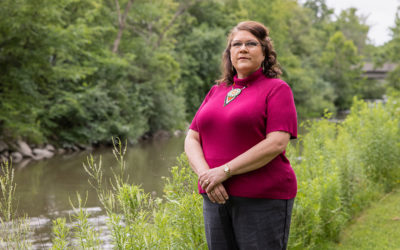By Keri Ferguson

Christy Bressette, BA'95, B'Ed'96, PhD'08, vice-provost and associate vice-president, Indigenous Initiatives (Western Communications)
Christy Bressette talks truth, reconciliation and the opportunity for innovation
With the launch of Western's first-ever equity census earlier this month, vice-provost and associate vice-president (Indigenous initiatives) Christy Bressette is sharing her vision for the journey towards equity, diversity, inclusion and decolonization (EDI-D) at Western.
In a webinar held Oct. 20, hosted by Opiyo Oloya, associate vice-president of EDI, Bressette emphasized the power of education in breaking down stereotypes and advancing reconciliation.
Harnessing and sharing culturally relevant knowledge, "proved to be a significant turning point in my life," she said. "I was able to overcome demoralizing stereotypes that characterized my early school years."
Western News recently sat down with Bressette, who shared her thoughts on the role of education in reconciliation, how Indigenous knowledge and ways of being can help guide decolonization, and the efforts to create a more equitable, diverse and inclusive campus.
Western News: Talk to us about the importance of education in moving toward reconciliation.
Christy Bressette: As Murray Sinclair, former chair of the Truth and Reconciliation Commission (TRC), said, education got us into this mess, and education is what will get us out of it. There is such wisdom in those sentiments, and that's how I see it as well.
It took us time to get to this point in our present-day circumstances, in terms of how we've responded to colonialism, and it's going to take time to decolonize. Murray Sinclair also gave me a metaphor, saying, "When you walk into the bush, you can get lost, but once you reorient yourself, it takes almost the same amount of time to get back out.
In our "want it now" society, people want reconciliation without understanding the need to take time to sit with the truth. I understand the tendency to want things quickly may also be because the truth is uncomfortable. Who wants to feel the anxiety, angst and pain? But until we learn with our heart, we won't get it in our head.
WN: What does sitting with the truth' look like for us at Western?
Bressette: It means taking the time to develop curriculum, workshops, pedagogical approaches and resources to help faculty and our students engage with the truth about Canada's history.
The appropriate framework to use moving forward is placing truth before reconciliation. If we skip over the truth, we're not likely to learn those lessons from the past.
WN: What's the significance of Western's focus on equity, diversity, inclusion and decolonization (EDI-D)?
Bressette: For a long time, it's only been a certain voice that has had much privilege to say anything about the kinds of problems we have in the world. When we create space at Western to hear diverse perspectives, to consider alternative ways of knowing and being, there comes the opportunity for innovation, and likely, ways that will transpire to achieve the results we need in our society today.
WN: How can Indigenous knowledge guide us to create a more inclusive culture for students, faculty, staff and graduates?
Bressette: There's so much beauty in Indigenous ways of thinking, knowing and being. In our societies, there's equity. Within that framework, everybody has a voice, everyone is seen, and everyone is understood as the gifts they are.
The first premise of democracy came from Indigenous communities. The United States constitution is based upon Indigenous notions of equality, framed as democracy.
I think when we see each other in our humanity, we have more things in common than our differences. That gives us space to embrace others or the unknown. That's what universities and higher institutions of learning are supposed to do as knowledge centres.
WN: How is the Office of Indigenous Initiatives shaping how Western approaches teaching and learning?
Bressette: I think the task at hand right now is making space for those knowledge sets that have not been privileged or given the opportunity to impact this world, very much like what we're trying to do in the Office of Indigenous Initiatives. The messaging coming out of our office is all about going back to our original instructions for people to live in harmony with the earth and with each other.
For example, I recently brought one of my relatives, Waasekom Niin (Edward George), to the President's Advisory Committee on the Environment and Sustainability (PACES). He's a water defender and spoke about how Indigenous knowledge helps guide everyone in restoring the right relationship with the earth, and with all systems, all beings. If that's not in place, then we're out of sync and out of balance and can't live the life we were intended to live. So much of education is really going back to these original teachings about taking only what you need, and living sustainably, with everybody being equal.
WN: Decolonizing the curriculum sounds like a big undertaking and may seem daunting to some people.
Bressette: I think it appears to be a big job because we've only ever known something that's the opposite of a decolonized curriculum. Collectively, universities, being largely Eurocentric, have never experienced it.
But decolonizing benefits everyone, not only Indigenous people. It creates space to hear all voices.
WN: Where do we begin?
Bressette: We're underway. We have the new EDI-D council working with Opiyo Oloya, Western's first associate vice-president of equity, diversity and inclusion, and the Office of Indigenous Initiatives. We collaborate closely, due to our similar mandate and shared vision.
It also starts with asking questions such as, who is here, and who is not here and why? Whose voices do we hear and whose do we not, and why? The online equity census will help us with that.
We ask these critical questions, not to harm any particular group, but with the goal of bringing other perspectives forward in this world.
Decolonizing involves increasing the diversity of the faculty complement at Western, looking at what we're teaching, and if diverse resources are available to instructors.
One of the big keys to this is allyship; people collaborating and partnering together, within the axiom of "nothing about us, without us."
WN: If someone is looking to be an effective ally, where can they start?
Bressette: The best thing anybody could do in any situation is to get educated. Find out as much as you can about Indigenous lives. Don't be afraid to ask questions. Question what you think you might know.
There are so many amazing people here at Western who have insightful perspectives, who are willing and very able to share their knowledge, such as my colleagues here in the Indigenous Student Centre and in the Office of Indigenous Initiatives. Our website lists 12 ideas to immediately engage and become effective allies working with us, one of which is to become familiar with the Truth and Reconciliation Commission of Canada's 94 Calls to Action. People need to read that. It gives context as to why this work is important, why it's needed and what the outcomes could look like. As people learn, they'll start seeing colonization is not just a Canadian problem, but a global problem.
I would also encourage people to focus on relationships. Connect with Indigenous people, get to know each other and build friendships based in equity and goodwill.
WN: How do you balance your optimism with the heavy work you carry out in your role?
Bressette: I get out on the land and the water - tracking birds and fishing. My connection with the natural world is important to me. It's how I maintain balance.
Christy Bressette (supplied)
I've been on my healing journey for a long time, while other Indigenous people are just starting theirs. I'm very conscious that everyone's healing journey is different and that everyone has their own outlet.
Above all, we must safeguard our mental health. The emotional labour of this work is difficult.
For example, next year when we have an observance of the National Day for Truth and Reconciliation, I'm going to be much more cognizant of the toll it takes to provide a whole day of programming. If we (Indigenous staff and faculty) weren't here on campus, providing that programming, perhaps we would be at home with family in ceremony, doing what we need to be well. There's a huge need to continually educate our friends and colleagues here at Western. We're happy to share knowledge for the betterment of everyone and the planet, but at the same time, we need allies to help us.










